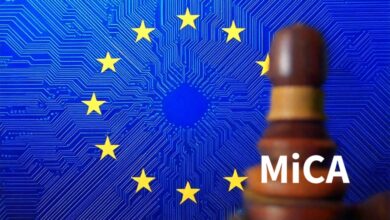First NFT Written Judgment in Asia is Out, Singapore High Court Recognizes NFTs as a Form of Property

The Singapore High Court published the grounds for its decision involving an interlocutory injunction that was issued earlier in May this year. This judgment is noted to be the first written judgment in Asia to protect an NFT.
In fact, Justice Lee Seiu Kin ruled that NFTs meet certain legal requirements to be considered property, such as being distinguishable from other similar assets and having an owner who can be recognized by third parties.
The claimant in the case used the NFT as collateral to borrow crypto from another party known by the pseudonym “chefpierre,” something he had done multiple times before with other lenders. However, according to CoinDesk, in the midst of discussing refinancing their loan, “chefpierre” threatened to exercise the foreclose option on the NFT unless the loan was paid back in full, which the claimant was unable to do.
The judge’s decision may prove a watershed moment for NFTs should investors and traders be more confident that their status as property is recognized in law.
The facts
According to Law firm CLYDE&CO, the facts and grounds for injunction are listed below:
- The claimant, Janesh s/o Rajkumar (“Janesh”) owned an NFT (“Bored Ape NFT”) from the Bored Ape Yacht Club, a NFT collection built on the Ethereum blockchain consisting of 10,000 unique NFTs.
- Janesh would often enter into loans with other users of an online NFT-collateralized cryptocurrency lending marketplace (the “Platform”) to borrow cryptocurrencies with NFTs as collateral.
- As the Bored Ape NFT was precious to Janesh, he would generally only deal with reputable lenders which were highly ranked by the Platform’s ranking system. Further, for every loan arrangement in which Janesh used the Bored Ape NFT as collateral, he would specify, amongst other terms, that the lender should never use the “foreclose” option without allowing Janesh reasonable opportunities to make full repayment of the loan.
- In January 2022, Janesh contacted the defendant, “chefpierre.eth” (“Chefpierre”) to discuss the possibility of obtaining a loan. Under the loan arrangement, Janesh secured assurance from Chefpierre that the Bored Ape NFT would not be “foreclosed”.
- After entering into the loan arrangement and subsequently successfully paying off the loan, Janesh entered into another loan arrangement with Chefpierre on 19 March 2022 (“19 March Loan”).
- On 19 April 2022, Janesh informed Chefpierre that he needed a short extension of time to repay the 19 March Loan. Chefpierre initially agreed to the extension and reassured Janesh that the Bored Ape NFT would be returned to him once the loan was repaid in full.
- However, Chefpierre later changed his mind and informed Janesh that he would use the “foreclose” option on the Platform if the full sum was not fully repaid by 21 April 2022.
- When Janesh was unable to find sufficient funds to repay the 19 March Loan, Chefpierre exercised the “foreclose” option and the Bored Ape NFT was subsequently transferred to the latter’s cryptocurrency wallet.
- Devastated by his loss of the Bored Ape NFT, Janesh made an injunction application to the Singapore High Court to recover the NFT.
- On 13 May 2022, the High Court allowed the injunction application and issued the grounds for its decision on 21 October 2022 to explain why the junction was granted.
Grounds for the injunction
In his decision, the judge held that based on the available facts, the Singapore court was the appropriate forum to hear the application. This was notwithstanding the decentralized nature of blockchain that could pose difficulties when it comes to establishing jurisdiction. The primary connecting factor was the fact that Janesh was located in Singapore and carried on his business here.
In addition, Justice Lee held that the present case demonstrated that it was perfectly possible for a person to conclude a contract with someone online where the parties to the contract have concealed their true identities using pseudonyms. Hence, even though the identity of Chefpierre was unknown, the judge’s view was that the Singapore court had the jurisdiction to grant the interim relief sought by Janesh.
Justice Lee also held that NFTs can be regarded as property. The judge considered that the classic definition of a property right in the English judgment National Provincial Bank Ltd v Ainsworth [1965] AC 1175 (“Ainsworth”) could be applied to determine if crypto assets (such as NFTs) were property.
The Singapore courts would examine whether the four requirements in Ainsworth could be satisfied:
- First, the right must be definable whereby the asset must be capable of being isolated from other assets whether of the same type or of other types and thereby identified. Justice Lee held that this requirement was fulfilled; metadata was central to an NFT and it was this metadata which distinguishes one NFT from another.
- Second, the asset must have an owner capable of being recognized as such by third parties; an important indicator is whether the owner has the power to exclude others from using or benefiting from the asset. Where NFTs were concerned, the presumptive owner would be whoever controlled the wallet which was linked to the NFT. Similar to cryptocurrencies, excludability was achieved as one was unable to deal with the NFT without the owner’s private key.
- Third, the right must be capable of assumption by third parties; this in turn involves two aspects: (a) that third parties must respect the rights of the owner in that asset; (b) and that the asset must be potentially desirable. In the present case, Justice Lee was of the view these requirements were met: the nature of the blockchain technology gave the owner the exclusive ability to transfer the NFT to another party, which underscored the “right” of the owner; and such NFTs were clearly the subject of active trading in the markets.
- Last, the right and in turn, the asset, must have some degree of permeance or stability. Justice Lee’s view was that the Bored Ape NFT had as much permanence and stability as money in bank accounts (the latter which, nowadays, exist mainly in the form of ledger entries and not cold hard cash).
Concluding thoughts
This case is significant not only because it is the first judicial decision in Asia to protect an NFT, but also because it is the first judgment in Singapore which dealt with whether NFTs were counted as assets. With other jurisdictions (e.g., the United Kingdom) recently recognizing NFTs as “legal property”, it is encouraging to see that the Singapore judiciary has now followed suit and recognized NFTs as property in its landmark ruling.
Additionally, we note that the decision included the High Court granting permission for Janesh to serve court papers on Chefpierre through Twitter and other chat platforms (e.g., Discord), as well as the messaging function of the latter’s cryptocurrency wallet. This decision is, in our view, a practical one. In cases of digital art theft or unauthorized use, the location of the defendant is always a major issue, given that their physical location cannot always be ascertained. Effecting service through social media/Internet messaging platforms would, in most scenarios like the present case, be the only practical manner.
Going forward, the express recognition by the Singapore High Court of an NFT as property means that, in practice, crypto assets will be capable of being the subject of freezing order and proprietary injunctions, which will provide greater protection to NFT owners in enforcing their rights in respect of their digital assets.
It is also important to note that a few days back, The Court of Rome sets a landmark precedent by granting an injunction against the creator of NFTs displaying images of a football player, reproducing without authorization the registered trademarks owned by Italian football club Juventus FC.





